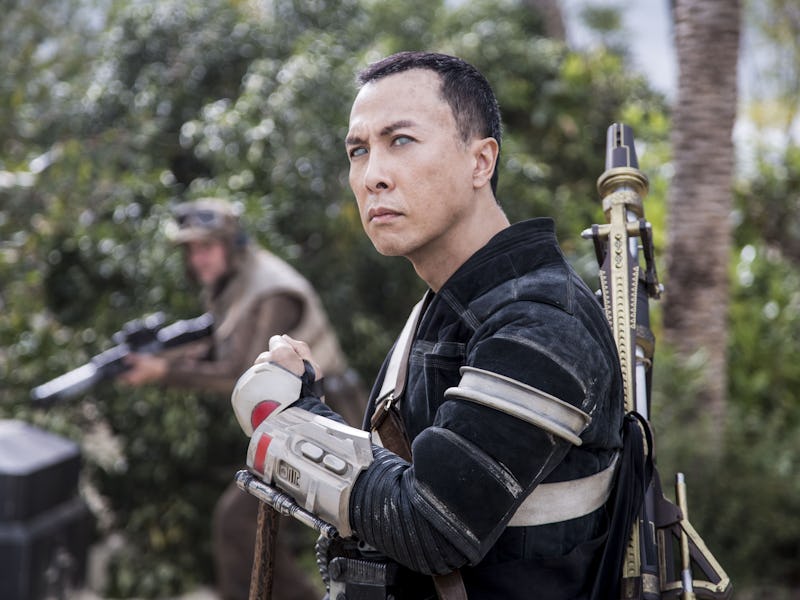Donnie Yen Changed His Star Wars Character to Make It Less Racist
To avoid perpetuating Hollywood’s same old stereotypes of Asian men, Donnie Yen had to give his Star Wars role some zest.

Donnie Yen could be one of the biggest stars in Hollywood, if Hollywood knew what to do with him. In a recent interview, the Hong Kong megastar reveals he gave critical input into one of his biggest film roles — Chirrut Îmwe in Star Wars — to avoid reinforcing tired Asian male stereotypes to a global audience.
In a lengthy profile for GQ to promote his role in John Wick: Chapter 4, Donnie Yen said it was his idea to give Chirrut Îmwe in 2016’s Rogue One: A Star Wars Story a few defining characteristics, namely his blind disability and witty personality. Had Yen not shared these ideas, he would have been “just the same generic martial arts warrior,” writes GQ.
“One thing I pointed out is he was a stereotype. Typical master. Doesn’t smile,” Yen told GQ. The outlet points out Yen “suggested making the character blind, and gave him a sense of humor, improvising jokes on the set — and, in turn, turning an otherwise straight cliché into the soul of the movie.”
For 2016’s Rogue One, Donnie Yen (front) gave creative input into his character to avoid playing a generic martial arts monk with a stoic demeanor.
The archetype of Asian men as stoic martial arts masters was largely popularized by the cult 1970s TV series Kung Fu, which starred (white) actor David Carradine as a half-Chinese Shaolin monk who wanders the Old West to uphold justice. The show’s popularity just prior to Bruce Lee’s stardom shaped a widespread stereotype of Asian men as quiet, reserved, and almost emotionless.
Rogue One hit theaters in late 2016, with Yen in the role of Chirrut Îmwe, a believer in the Force. While Îmwe is adept at hand-to-hand combat and has a monk-like vibe, his biting wit and sarcasm made him the movie’s second biggest source of comic relief (behind the incomparable Alan Tudyk as K-2SO). Importantly, Îmwe is never the butt of the joke, which also goes a long way in making sure that Yen isn’t an emasculated figure either.
The Same Story on John Wick
More than half a decade has passed since Rogue One. But as Yen’s interview indicates, Hollywood still can’t stop seeing Asian actors in a stereotypical light. A similar situation happened with Yen again on the set of John Wick: Chapter 4, with Yen’s character “Caine” originally more evocative of antiquated “orientalism.”
“The name was Shang or Chang,” Yen recalled. “Why does he always have to be called Shang or Chang? Why can’t he have a normal name? Why do you have to be so generic?”
Yen said his original costume included mandarin collars, which would have forced Yen to look “otherized” against his co-stars in bespoke suits. “This is a John Wick movie. Everybody’s supposed to be cool and fashionable. Why can’t he look cool and fashionable?” Yen said. In conversations with director Chad Stahelski, Yen’s role was altered to bear the name “Caine,” and his costume is partly inspired by the 1970s-era fits of Bruce Lee.
Donnie Yen in John Wick: Chapter 4.
Yen’s story is proof that no matter how big a movie star you are — Yen is one of the most prolific in Asia, his profile overseas parallel to the careers of Arnold Schwarzenegger and Tom Cruise — Hollywood will always box you in if you’re not a straight, white male.
The GQ interview as a whole paints Yen as almost disillusioned, as someone who has sacrificed his health for an era of filmmaking that’s all but vanished in the age of VFX. The article ends with Yen revealing he rarely considers Hollywood roles; he’s passed on parts on Expendables and Aquaman because what were offered were not meaty. “These kinds of opportunities occasionally come up: ‘You want to be in this?’ It doesn’t mean anything,” he said. “If I’m not allowed to have my creative control, it’s not worth my time.”
It’s not all doom and gloom. Yen said there’s a “big difference” in how Asian actors like himself are treated in Hollywood than when he first tried to break in. (One of his earliest Hollywood roles was in the Marvel movie Blade II, where a producer ignored him on set and disrespected his process.) “I think action movies ... are a genre that everybody in the world can appreciate,” Yen said.
This article was originally published on